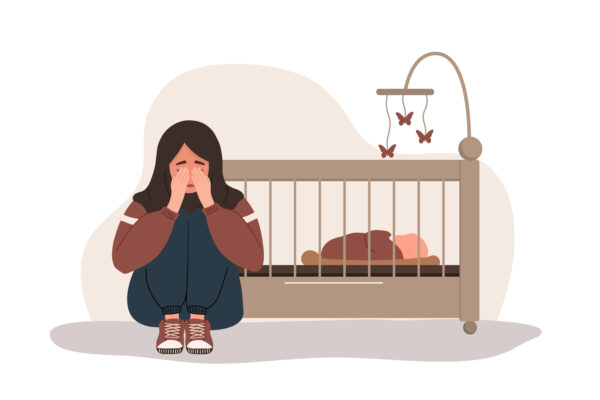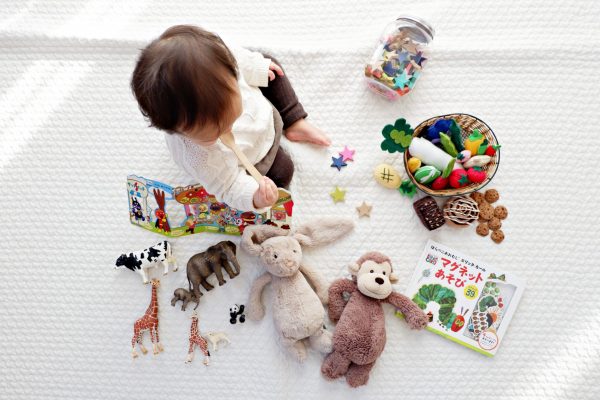My postpartum depression was triggered by many things including my weight gain, my daughter’s aversion to breast milk, and fears of being a new mom. There were so many uninvited opinions I heard everyday about my weight gain from people that pulled me one step back from feeling better, and I started body shaming myself.
My postpartum depression was triggered by many things including my weight gain, my daughter’s aversion to breast milk, and fears of being a new mom. There were so many uninvited opinions I heard everyday about my weight gain from people that pulled me one step back from feeling better, and I started body shaming myself.
On another overwhelming day, my phone had been ringing for over a minute. I answered and a soothing voice came through the phone asking, “How are you feeling?” It was my midwife, and she has been diligently keeping track of my mental heath since I delivered my second child. Living in Sweden has been a blessing for me; the prenatal and postnatal care has been exceptional. Having a baby is one of the most exciting and nerve-wracking experiences that a person can have in their life, but it can be very easy to get overwhelmed and lost in the moment.
According to the World PPD Statistics, 65% or more new mothers in Asian countries are found to have postpartum depression. The birth of my first child was much more over-whelming than I expected – your body is physically recovering from childbirth, your hormones run wild, and you’re getting to know your baby while trying to get some sleep, eat, and be sane. I was in Pakistan when she came into this world and I felt so vulnerable filled with many fears and thoughts that couldn’t stop racing in my mind. It induced some of the most debilitating, scary, and guilty feelings that I have ever felt.
My postpartum depression was triggered by many things including my weight gain, my daughter’s aversion to breast milk, and fears of being a new mom. I was delusional enough to believe that I would lose all of my pregnancy weight in a day or two after giving birth but nothing like that happened. I was unable to accept the fact that pregnancy weight gain fluctuates and coming back to your old body is a journey in itself. There were so many uninvited opinions I heard everyday about my weight gain from people that pulled me one step back from feeling better, and I started body shaming myself.
Even though I had physical help, very few of the people surrounding me were aware of PPD and its impact on new mothers. When I first got the news that I was expecting, my mother-in-law took me to the best health care provider I could get, but to be able to see the best means long, long hours of waiting. It was so exhausting that sometimes I used to wait five to seven hours just for 15 minutes of check-up or less if the pregnancy is normal.
After I had my baby, my obstetrician got changed from a female to a male doctor who was the only source of information on breastfeeding and other phenomenons that new moms experience. When I informed him that my daughter was not latching on, he just asked me to take my mother’s help. I had no lactation expert, no healthcare official asking me about my emotional and mood changes, and no one to discuss all my personal and private questions. It was very clear that my male doctor was uncomfortable openly discussing issues that seemed taboo in Pakistan’s gendered, conservative society. No one mentioned the word postpartum depression, and no one followed up with me after I left the hospital.
I was struggling and the situation worsened when she refused to drink my milk. My negative thoughts and fears grew and I felt useless to her. There were so many questions of mine that were unanswered. My constant sadness made me cry for hours. One day I had a meltdown at my mothers place, which scared her and she asked what was wrong. I questioned her instead about how she felt when she had her children. She said she felt nothing, and that she had no time to feel anything, especially when she was in a joint family system where she was also a wife and a daughter-in-law with responsibilities.
Women like my mother have traditionally been expected to act and behave the same way they have prior to having a child. Many women living there still have no idea about postpartum depression and are completely out of touch with their feelings. Most of them are scared to break the taboos and to find out what is happening with them.
Research has shown some women are at a higher risk of having PPD, including women who have had PPD with a previous child, have struggled with depression, or have another mental health illness. To seek help we have to begin by first starting to accept what we are feeling. I shared this part of my story because my PPD depression ended with the endless support of my family. This was one of the most straining times of my relation with my husband, because PPD comes with a lot of anger, regrets, and rage, which can impact your relationship. He was emotionally present, and made sure I ate healthy and felt happy. My mother-in-law stayed with me for a year to help me with my kids, and my in-laws were always there to listen.
The power of postpartum depression is indescribable. There are many people who don’t survive it. Even for those who do, it changes their life. It makes you feel like you can’t survive it. It makes you feel hopeless, broken and desperate. One of the biggest problems with it is that you feel that there is something wrong with you, because you don’t feel all of the things you’re suppose to feel that has been taught to you. We have to keep talking about it, until every woman feels safe and comfortable opening up. Make space for mistakes. Try self-compassion when you disappoint yourself. Learn skills to help regulate your emotions if necessary. Take care of your marriage and partnership. Sometimes all a new mom needs is someone to ask them, how are you feeling?





